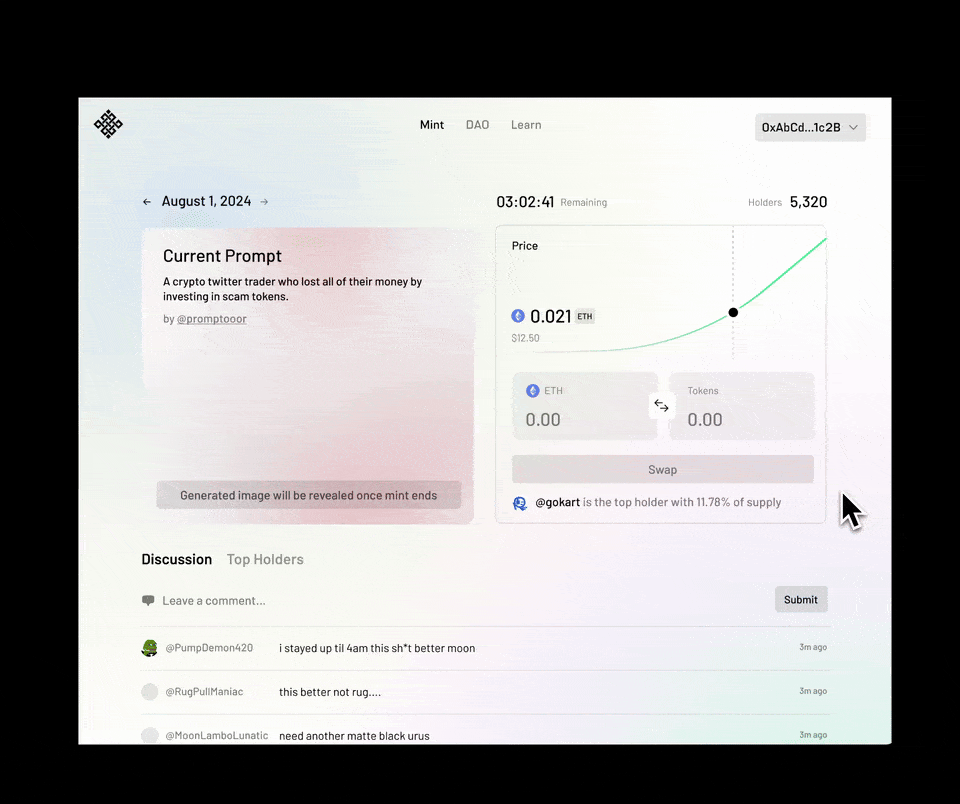Consumer Applications And AI
Consumer applications have proven to be some of the most difficult to build in the blockchain space. It’s hard to balance incentives with interesting gameplay and sound mechanism design. We need to innovate on ways to keep users engaged and active, avoiding the common trap of simply following short-term incentives. There’s a lot of unique ways to approach this, but we think a big part of the potential success here is meeting users where they’re at:
We know that memecoins are *fun*, and provide interesting dynamics around social trends and capital. We are also generally excited about unlocking the ability for users to win the right to influence the future behavior of some model, such as controlling prompts around a shared model or getting the right to finetune said model. We think that the intersection of the two can lead to some very entertaining and emergent on-chain behaviors. To inspire builders, we’ve prototyped Opus: a fusion of recursively generated AI content, memecoin trading, and a new approach to DAO membership
Introducing Opus
At the heart of Opus lies its NFT generation mechanism. Every fortnight, a Opus NFT is minted by an AI model, using the previous contest’s NFT image and an additional prompt as an input to create a mutation. This gives a lineage to the art, every new token having an imprint from its predecessor. Simultaneously, an ERC-20 token tied to this NFT is launched, following a bonding curve model that dynamically adjusts its price based on supply and demand. Players then engage in a two-week trading frenzy, with the ultimate goal of holding the most tokens when the clock runs out. The trader with the most tokens at the end becomes that contest’s winner, receiving the NFT.

Each token transaction incurs a tax, feeding into a communal treasury. As mentioned, winners of each contest become part of a decentralized autonomous organization (DAO) that controls this accumulated wealth. This creates a compelling loop where success in the game, as well as the game’s own virality, translates to real governance power, allowing players to shape the very ecosystem they compete in.
The technical underpinnings of Opus involve several aspects. Ritual’s infrastructure allows us to generate asynchronous inference requests to generative image models from our smart contracts. We leverage the model’s capability for img2img generation to specifically achieve our ‘mutation’ flow. Not only that, but since the img2img model can also take in a text prompt to guide the generation, we allow the previous contest winner to set this text on-chain. This creates another interesting gameplay dynamic for the competition, as winning a round lets you not only join the DAO but also influence the future rounds of the game.
Looking Forward
We think there’s a lot of options to expand the mechanics of this game as well: having AI agents participate or barter on behalf of real users, having AI controlling the token mint/burn functionality, having multiple contenders setting up mini DAOs to manipulate the game theory of the contest/seek control of the future prompts (think partyDAO groups), and even building in probabilistic mechanisms to try and end rounds early.
The NFTs themselves could also link to claims for real-world items of value, creating a bridge between the digital and physical realms. This could include rare collectibles like limited edition prints of the AI-generated art, exclusive experiences such as VIP access to crypto events or meet-and-greets with influential figures in the space, or even high-value items like luxury products and tech gadgets. By incorporating these tangible rewards, we not only doubly incentivize participants but also expand the appeal of the game beyond the current cohort of crypto natives. The possibilities are endless here and we look forward to seeing what folks can conjure.
Interested in building this all the way? Make sure to apply to Altar.